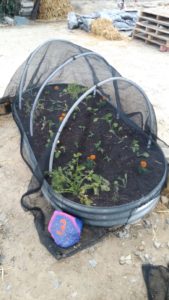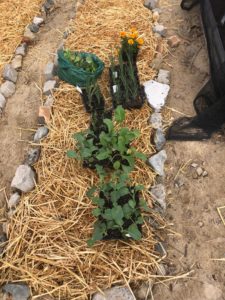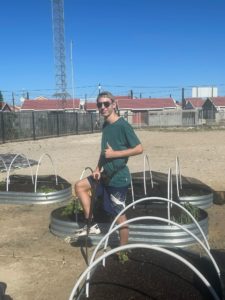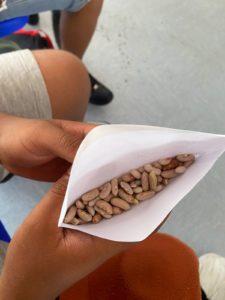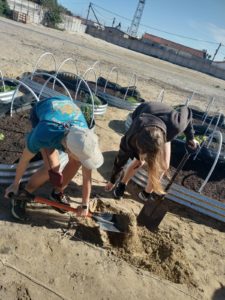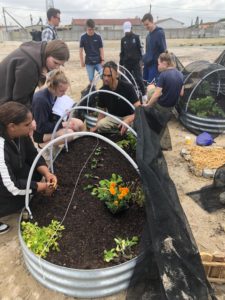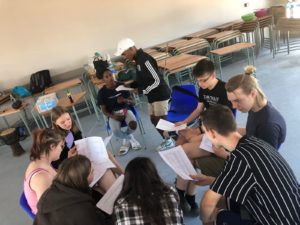How does this project affects climate change?
So much has happened during the week, and summarizing it all is difficult. I still see myself standing in front of the area where the permaculture garden was supposed to be created for the first time, and I wasn’t quite sure if it would work out, but it turned into something great. Who would have thought that so much thought had to go into where the garden should be positioned? It was very exciting. From preparation to the finished garden, so much has happened, and we all had a lot of fun. But if you ask me what I take away from the week, it’s how to create a compost, 4 carbon to 1 nitrogen, how to prepare and plant a bed, plant plants, make liquid fertilizer in the Korean way, harvest seeds, and much more that I will try to implement at home.
But permaculture is so much more than just a garden. Imraan and Neo placed a lot of emphasis on us getting to know each other better and becoming a team, and they succeeded. In any case, it was worth creating a permaculture garden, as it allows for year-round, locally grown organic food. By switching from monoculture to permaculture, the soil is protected, and biodiversity is maintained and increased both in the soil and on the surface. Since plants help each other and replenish the soil with nutrients such as nitrogen, many yields can be achieved in the long term, all without the use of pesticides.
This definitely has a sustainable positive impact on climate change, and I would definitely do it again.
-Carl-
We did a lot of things this week and to summarize them all would take to long. We learned how to make compost, build a garden bed, planted seeds, made fertilizer and learned a lot of other things. We were taught how important the position of plants in a bed because some need more or less light and how some plants grow better together or how some group of plants help other groups of plants grow. And rather than using pesticides you can sow other plants, that repell insects. But it also showed us how to help stop climate change, like instead of monoculture farming, we can grow different plants, that give the soil the minerals back, we take from it. That also helps the plants grow better, then you plant the next batch and increases the harvest, so smaller areas can be used. And food that would normally be flewn across half the planet we can grow in our backyard.
-Timo-
We did a lot of things and its hard to summarize all of them. There are like the obvious things probably everyone thought of first like build a composter, build the bed, planted the crops, made our own fertilizer or painted the rock, but there is much more we did. Like we learned a lot new stuff and things we probably never thought of, even the small ones like the sun is shining from the north in the southern hemosphere or that we cant just plant ranfom plants together, because they maybe arent good for each other. All in all was it an interesting project with a lot of things we learned and it probably even upgraded our english skills. But the english skills isnt the only thing it was good for. It was good for stopping the climate change too, because when we learned how to plant crops and grow sandy areas green, so we can lower emissions and stop climate change. It was also good for climate change because with a permaculture garden we give the earth the minerals and nutrients back we stole from her with monoculture and so we can maximize our harvest and dont have to use big areas with a worse harvest because of the mineral and nutrients lack and we can get rid of pestizides.
-Richard-
In the last week I have been able and allowed to experience an incredible amount. It was incredibly fun to work on the permaculture gardens. The small workshops, dance sessions and reflection sessions were also fun. It also made it possible to get to know the others better. We learned a lot about permaculture gardens and their importance for the climate. Permaculture gardens are much more sustainable than monocultures, because the different plants work together and help each other. In addition, we learned how to make compost and fertilizer. In addition, when planting the plants, you have to pay attention to an incredible amount of things that you never thought about before. Namely about the space the plants need to grow, about the soil, the plant species… The aim is not to intervene in nature as silly as with chemistry, but rather to work with it. So to operate regenerative agriculture. Before the project, I just thought we’d just plant a few plants and be done. But on the contrary, you have to plan a lot and do a lot of preparatory work. If we all had our own permaculture garden, the environmental pollution from any gases would be greatly reduced, which would be positive for the climate.
-Lisa H.-
During the course of the project, I learned both the social aspect, through teamwork with the South Africans, and the planning and image of a permaculture garden test. The zest for life and energy that the South Africans brought to the group immediately pulled me in and made me work harder on the project. The social aspect, was for me personally the most impressive during the work. Respect. To me, the Permaculture Garden means more than just providing for the students. Rather, to me, it means building and creating something together. The way of the Permaculture Garden. It was very special to me. Because of the collaboration several plant and people. Because of the fact that in this Permaculture garden no pesticides are used and the fruits and vegetables are grown regionally and seasonally. Is this the best for the environment. Through the team of imraan and neo I learned all the relevant things I need to form a permaculture garden myself. It was great to be a part of something bigger than yourself. The environmental aspect in this project has not taken a back seat for me personally, despite all the beautiful experience with the group. This garden represents for me a partnership of people and the environment.
-Lilly F.-
I learned very much this week. I never thought that permaculture gardens are that important for our climate. It’s not only about supply people with food. It’s about community, health and future. Now, I see permaculture like an opportunity to do something against climate change. There are many advantages. You don’t have to use pesticides, you don’t need that much water, because bigger plans protect the smaller ones from drying out, you protect the soil, because you don’t just take from the earth you also give something back. I think permaculture should be more popular. It’s a step into the right direction to slow down climate change. Before our project I knew that a permaculture garden involves different kind of plans. After our project I know that it is so much more complex. You have to pay attention to the space the plant needs to grow, the growing conditioning, the seasons, soil and much more. The workshop helped me to understand all this better. It was great.
-Mathilda-
This week was amazing I’ve learned so many things, I learned about the benefits of permaculture over monoculture and how Permaculture is a sustainable agricultural practice that involves creating diverse and self-sustaining ecosystems, whereas monoculture involves growing a single crop over a large area where Permaculture gardens are more resilient to pests and climate change, require less water and fertilizer and produce a healthier variety of food. To build a permaculture garden, one must consider the soil, crop planting and planning, Bed planning, etc.Overall, I am excited to use what I learned to create a more sustainable and productive garden and a better future.
-Anzio-
I had an amazing week with great new impressions. In the project I learned about the permaculture, compost, plants, fertilizer or even team building. I’ve learned a lot of new things and thought about things I’ve never thought about before. It helped me a lot to get to know people better and I felt very comfortable in our group. Besides all the fun, I also learned things about our climate. Permaculture gardens are more sustainable than monocultures. In the soil are more nutrients and minerals than in monocultures, so we have a better harvest. Food from your own garden is healthier for our body and, in addition, the transport routes of the food are save and we produce less carbon dioxide. It is an ecological and regenerative solution for consumption by everyone. So to sum it up, permaculture gardens are better for our climate and for us.
-Nele-
We lerned this week much about Permaculture. How we can finde the best place for the plants. And how we can give the plants the thinks the need (Compost, Plant Juice). We also lerned how we can harvesting the best seeds.Many people don’t know about. Permaculture the grade were the plants help the awser plants. Permaculture is a go think for the climate you can plant your one plants and can eat then. So you don’t must buy plants were Importe from a awser country. And if you make Permaculture you also not distroy the soil because you don’t spray fertilizer.
-Lilli-
This was one of the most amazing weeks this year i have learned alot this week how to keep my enviroment how to keep plants safe and many other things we can name but the most important one permaculture garden for climate change how does it have an impact on climate change the positive feed back its giving now there is one of the tools we can use to improve climate change.. One thing that stood out for me the most is learning how to create your own garden in the comfort of your own home and all the tools you need its just here so that means its keeping our enviroment clean and healthy and having an positive impact on climate change.
-Diego-
We had alot of conversations about climate change and how we could try and make a difference but never actually did and the past few days we actually made a difference maybe not a huge one but I believe it’s the little things that matter .I’ve learned how to start my own garden at home and I always thought that it would be so easy but there was more to it and what’s really fascinating about it is that all that hard word isn’t for nothing it can be an income and you can make a change. I’ve learned so many amazing thing the teamwork was the best part of it all
-Tamia-
During the time we built this permaculture garden together, I learned that the garden can do something against climate change. You can grow your own garden and also grow more food for yourself. but this only works if you know how to build one and which plants help each other. It’s good for the climate because we don’t emit as much Co2 because we save on transport. They also emit oxygen. In addition, what we grow comes directly from the local environment.
-Emily-
We all think a lot more about climate change. We talk about it with others and thereby draw attention to it. Through the garden we are doing something about climate change. We act sustainably. We can also implement our newly acquired knowledge at home and thus teach it to others.
-Alexis-
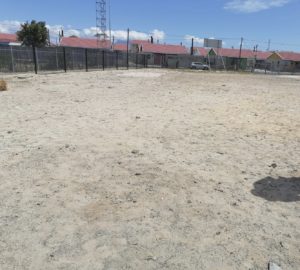 ————>
————>